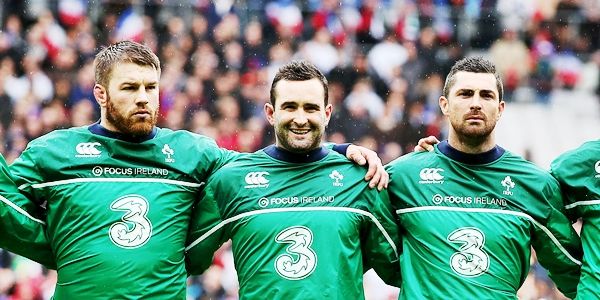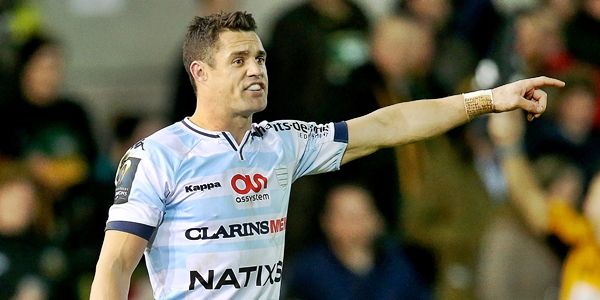

Share
4th March 2016
10:35am GMT

"I'd be on WhatsApp to the guys in the dressing room sometimes. I'd be very close to Rob [Kearney]. He's like a little brother to me at this stage. "I'd be in touch with the guys on match-days, generally before and after a game. 'Well done; how did you get on; are you alright?' Whatever it happens to be. "Sometimes you give them a bit of distance. If he's had a howler, most people would not want to talk about it. When they lose, you may leave it to the team meal and then put out the WhatsApp. 'How are you feeling?'"It's business but, more often than not, it's personal.
 "To have a commercial profile," McHugh explains, "you have to be in the first five, or eight, players for your country. There are only five or eight that do well off the field.
"To have a commercial profile," McHugh explains, "you have to be in the first five, or eight, players for your country. There are only five or eight that do well off the field.
"Within that [scope], you have a commitment to your team and to your country. You have an awful lot to do in terms of what your club [province] want you to do in terms of their partnership and similar with the IRFU. So how much can you do around that? "It's the Brian O'Driscoll model - less is more. Have two or three big partners and devote all your time to them, instead of having 10 small partners and getting spread too thin on the ground and wheeled out here and there. "Again, this is only a problem for four or five players from the national team - where they are in demand and they have to say 'No'. For the majority, they are not enough in demand and they are delighted to do things that can give them a commercial earning away from the field." 'We have to manage expectations. Firstly, if they are not playing well on the field, they do not have a profile. If they are not getting selected for their province and country, and are not a starting name, people are not that interested... You really have to be the cream of the group to have that 'We want to be associated with you' factor. "Those [current] players are Rob, Johnny Sexton, Sean O'Brien, Pete O'Mahony, Tommy Bowe, Conor Murray, Jamie Heaslip, Robbie Henshaw. After you get out of that group, you're not really... even Paul [O'Connell] and Brian have more value now that they are not playing. They're accessible. Keith Woods is still generating commercial income from the game and he retired 12 or 13 years ago."Today, Line Up has both Kearney, his younger brother Dave, Fergus McFadden, Sean O'Brien, Ian Madigan, Mike Ross, Donnacha Ryan, Brendan Macken and Tadhg Furlong on its books.
 Succession planning is key for McHugh and his company - a senior player brings in an up-an-comer. For example, Ross brought in Furlong. Tighthead for tighthead.
What McHugh and Maeve Buckley, his colleague, specialise in are the commercial and player-management sides of the game. The company acts as an advisor, or go-between, during contract negotiations but leaves the nuts and bolts to the Esportif agency run by Ryan Constable, a man who's global networking is, by now, the stuff of legend.
"The contract game is simple in Ireland," he says. "It is 5% of the retainer.
"On a €50,000 contract, that's not that much. On €500,000 it is an awful lot more.
"The other side of it is that you cannot look after too many players as you would not be able to probably service them."
Succession planning is key for McHugh and his company - a senior player brings in an up-an-comer. For example, Ross brought in Furlong. Tighthead for tighthead.
What McHugh and Maeve Buckley, his colleague, specialise in are the commercial and player-management sides of the game. The company acts as an advisor, or go-between, during contract negotiations but leaves the nuts and bolts to the Esportif agency run by Ryan Constable, a man who's global networking is, by now, the stuff of legend.
"The contract game is simple in Ireland," he says. "It is 5% of the retainer.
"On a €50,000 contract, that's not that much. On €500,000 it is an awful lot more.
"The other side of it is that you cannot look after too many players as you would not be able to probably service them."
 McHugh says one of his company's golden rules is that one does not read about it in the press until the deal is done. "In Ian's case," he notes, "we couldn't keep it quiet because he had to tell a club he was not intending on staying." He continues:
McHugh says one of his company's golden rules is that one does not read about it in the press until the deal is done. "In Ian's case," he notes, "we couldn't keep it quiet because he had to tell a club he was not intending on staying." He continues:
"Some agents, in the past, would have used the media to leverage their position, which, in my opinion, is wrong. With our model, it's nobody's business. It's the same way as I won't ask you what you're getting paid. "I'm not going to ask you that. You're not going to tell me and I'm not going to tell you what a player is getting. So why should the general public know what a player is on. The only reason they feel they have a right to is because it's the only professional game in Ireland. Everybody's asking and everybody's interested."It may appear that the threat from France's Top 14 and the off-the-financial-leash Aviva Premiership has been staved off but McHugh believes each year will see clubs look to Irish shores.
"There are 14 teams in France and 12 in England and only four here. All their clubs, in France, are owned and financed by private individuals. The private owners can pay what they determine is fair, reasonable or ludicrous [for players], in their opinion. Thirdly, their television rights are far more valuable as there are 60-odd million people there. There is naturally more money in their game. "The UK has a salary cap. So does France but it is higher and you are allowed one marqueé player outside that cap. There's your Dan Carter. "In Ireland, we don't have salary caps. We have budgets. A province has their budget and the IRFU has their's but we can;t go to X, Y, Z lengths to encourage a player to stay here."There is hope, however. McHugh believes Ireland has the best player welfare system in the Northern Hemisphere. Players only play a set number of games and are well remunerated for it. They also get to live at home, pursue an education and are encouraged, and aided, in outside business pursuits. "The system works," he continues, "and is second to none. In France, you're an asset. You play until you break. If you can't be fixed, you're thrown on the heap. If you break and can be fixed, well 'Get back because we need you to play'. "If you stay fit and are not playing Test rugby, you could be expected to play 30+ games a year. That's just the way it is. It's business."
 Ronan O'Gara, who now coaches Carter at Racing, has stated his belief that Ireland may well have a €1m-a-season player before the 2017 Lions Tour. McHugh is not so sure but anything is possible. He says:
Ronan O'Gara, who now coaches Carter at Racing, has stated his belief that Ireland may well have a €1m-a-season player before the 2017 Lions Tour. McHugh is not so sure but anything is possible. He says:
"There is always that consideration - Does he put bums on seats? Does he sell jerseys? "If you look at those top seven or eight players, again, they do that. Be it in Leinster or Munster. If you are Bank of Ireland [the two province's jersey sponsor], you want those top players out there... "The IRFU and the provinces definitely value the players ability to market and promote them. Whether you get into the state of having separate contracts, I don't think it is that close, but it would only apply to a handful of people."For McHugh, and Line Up, it makes life easier to have a good scoop from that handful. This weekend, with O'Brien and Dave Kearney out injured, McHugh may have less WhatsApp messages to send. Still, he will be no less anxious, rapt or proud of his clients, and friends, striving to get Ireland back on track.
Explore more on these topics: